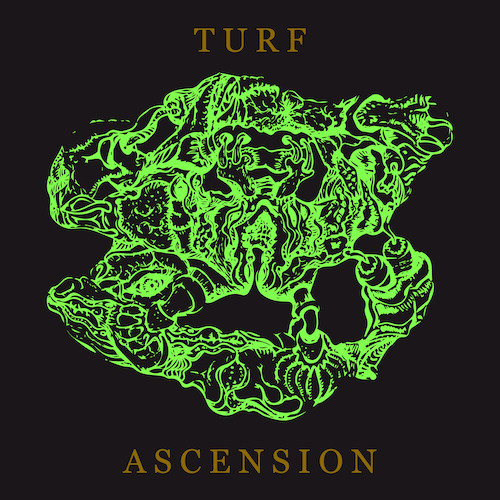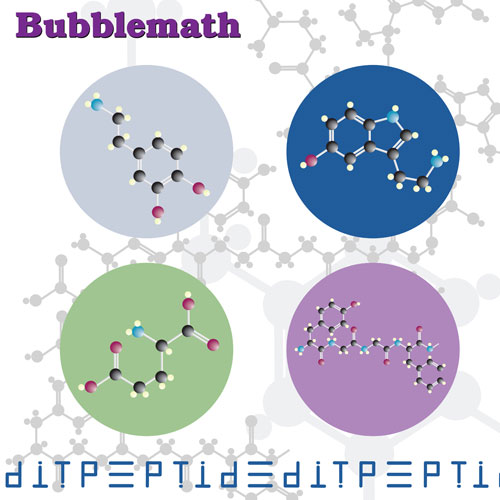Bubblemath’s new album, Turf Ascension, is the finest progressive-rock album you’re ever going to read.
This is not to short-change the music on this four-song, 49-minute
collection of shifting time signatures, swirling vocal harmonies,
interstellar guitars, and rippling keyboard flourishes.
Hailing from Minneapolis, Minnesota, Bubblemath’s Blake Albinson, Jay
Burritt, Kai Esbensen, James Flagg, and Jonathan G. Smith have taken
full advantage of their hometown’s long winter nights to hone a
singular style that’s at once thrilling, enthralling, and technically
demanding.
Not just winter nights, in fact, but entire years. Although the members
of Bubblemath joined forces well over two decades ago, Turf Ascension is only their third full-length, with a 15-year gap falling between their 2002 debut, Such Fine Particles of the Universe, and 2017’s Edit Peptide, their first for the Cuneiform imprint.
Asked why such a gap, keyboard player and chief lyricist Esbensen blames “happenstance”.
“Our first record, Such Fine Particles of the Universe, we started recording it in 1999, and we took two years to get that out,” he explains. “We were all like, ‘That took two years! That was way too long. Let’s not make that mistake again.’ So we immediately went into the studio and started recording Edit Peptide.”
The band’s obsessive attention to detail almost immediately sabotaged
the chance of meeting any reasonable deadline. Once the initial budget
was drained, the band members realized they had essentially paid to
equip their engineer’s studio. Why not do the same for themselves?
Microphones, a ProTools setup, and soundproofing were quickly obtained.
“But the punishment clause for owning your own equipment is that now
you have it, there’s no longer any deadline spurring you along. No
money that you will continue to owe, and no other bands coming into the
space to kick you out,” says Esbensen with a rueful laugh. “So the
perfectionism of Bubblemath crept in pretty quickly, and we just took
forever to get our takes and arrangements just exactly, perfectly,
insanely correct.”
The band’s hard-won knowledge enabled it to produce Turf Ascension in a comparatively fast-paced five years. Actually listening to the record, however, is a decidedly more luxurious experience.
“With this record, we really allowed ourselves to develop themes,”
Esbensen contends. “If you listen to our first record, or even Edit Peptide,
it’s like we have this mantra of, ‘Why repeat something four times if
you can get away with only three?’ That kind of thing. ‘Why give the
listener a chance to get bored? Switch it up! Keep it going!’
“It was A.D.D. kind of stuff,” he continues. “And with Turf Ascension,
we were like, ‘Well, what if we just lingered on stuff longer, and
built out the themes?’ Before, we would have gone, ‘Well, we can’t, in
case it gets boring.’ But here the followup question was, ‘Okay, well,
what if we just work really hard to not make it boring?’
Switching up the themes quickly in order to hold listener interest is
obviously our comfort zone. But in that regard it’s almost a crutch -
sort of like having chocolate in a dessert is kind of a crutch. A
chocolate dessert is pretty easy to make successful. But what if you
had to create a dessert with cucumber and pomegranate? How do you make that good?
You have to be really mindful and deliberate, if that’s not your
culinary wheelhouse. So it was a fun challenge to let the themes evolve
and flow in a way that we really haven’t ever done before.”
It’s tempting to call Esbensen’s lyrics the icing on this
cucumber-pomegranate cake, and the idiom is not as clichéd as it might
seem. While it may be easy to assume that Bubblemath’s music exists to
illustrate its words, the reality is a little different. In fact,
Esbensen’s detailed plot lines and well-considered meditations on
existence come at the very end of the songwriting process, after the
song structures and vocal melodies are already in place.
With the 17-minute, 57-second epic “Surface Tension”, for example, what
reads like a science fiction novella emerged from Esbensen’s
spur-of-the-moment playfulness.
“It was actually kind of a lucky break,” he says. “We had the vocal
melodies already written, as we do, and one of the first things that I
do when I’m writing lyrics is to fit nonsense words into the melody
lines so I can feel out where the syllables should go and where the
rhymes should fall. And the very first nonsense lyric I put in was, ‘In
the wall of a bathroom, down the hall from the math room.’ That made me
laugh, and so I started thinking what that could be about. And from
there I pictured a high school, and a mysterious government computer
system clicking away in the walls, with its grand purpose poised and
ready for action. And then, meanwhile, the name ‘Bubblemath’ is a
reference to the physics of surface tension. So once I decided to have
this school burrowing into a secret underground human-race-preservation
facility, I was kind of delighted that ‘Surface Tension’ could be the
name of the song, given our protagonists’ longing to ascend from their
bunker-compound back to the surface.”
The album title Turf Ascension,
in turn, grew out of a spoonerism concocted by guitarist Albinson. It
also gives a clue as to how Bubblemath operates: every aspect of the
band is interconnected.
While claustrophobia,
paranoia, and fear for the future are explicit in “Surface Tension”,
variations on those themes underpin the other three songs on Turf Ascension.
“All songs deal with ascending one kind of turf or another, whether it
is literal dirt turf or figurative conceptual turf,” says Esbensen. In
the song “Decrypted”, it’s both: a dead apple tree refuses to
admit defeat or even acknowledge its own death, and this anomaly opens
the door, inviting the listener on a quest to decipher the mysteries of
DNA. But the song can also be interpreted as referring to the onslaught
of misinformation we all have to wade through, as well as to the
persistence of life in the face of impossible odds.
“Everything”, meanwhile, posits that the entire universe is a
simulation, a concept Esbensen traces back to the Swedish philosopher
Nick Bostrom’s 2003 essay, “Are You Living in a Computer Simulation?”
“I had read that, and I thought, ‘Oh, that’s a fun concept for a
song,’” he says. “It’s existential ennui meets meta-science
plausibility. Questioning the bounds of what we know, as those very
bounds subsume themselves. And it kind of goes back to the day-to-day
gripes and grievances that people have, and the cortisol that people
pointlessly expend being bothered by who gets food stamps and who
looked at you funny when you were buying coffee that one time. It’s
about how, ultimately, everything is probably fairly petty in the grand
scheme. It’s like, ‘You’re worried about gas prices when the whole
thing is a hologram? Choose your battles wisely, ya know?’”
On the subject of battles, more pressing existential worries are
reflected in “Refuse”, a critique of unchecked weapons technology, and
the contentious geopolitical border conflicts that drive it. Something
that has never been more relevant than it is today.
Esbensen deflects the notion that he has a hotline to the zeitgeist, or
that Bubblemath’s extra-musical mandate is to inject social commentary
into the often apolitical world of progressive rock.
“Really, I just wanted to make sure that the lyrics were as good as the
music,” he explains. “In so much of the music that I love, the lyrics
come across like they were just kind of chucked in as an afterthought.
I can roll with that for the most part, but the more I like a song’s
music, the sadder I get when the lyrics don’t measure up. So I just
want to make sure that the lyrics for Bubblemath deserve the music of
Bubblemath.”
Nonetheless, the keyboardist is willing to counsel those perplexed by confusing times.
“Question stuff, but keep tabs on yourself,” he says. “Pay attention to
what you’re questioning, as well as what you’re not questioning. And
pay attention to why. Learn your biases. Self-deception is a real
problem, so employ methodologies to mitigate self-deception as much as
you can. You can’t eliminate it completely, but it’s important to
understand that about oneself, and to be really mindful and aware of
it.”
Sage advice. And nothing would help this process of self-discovery
along more than the high-energy, hyper-intelligent, and tuneful tracks
on Bubblemath’s Turf Ascension.
Turf Ascension press release


